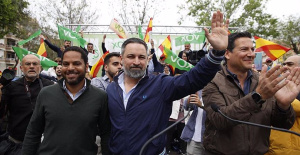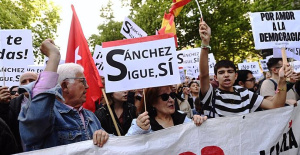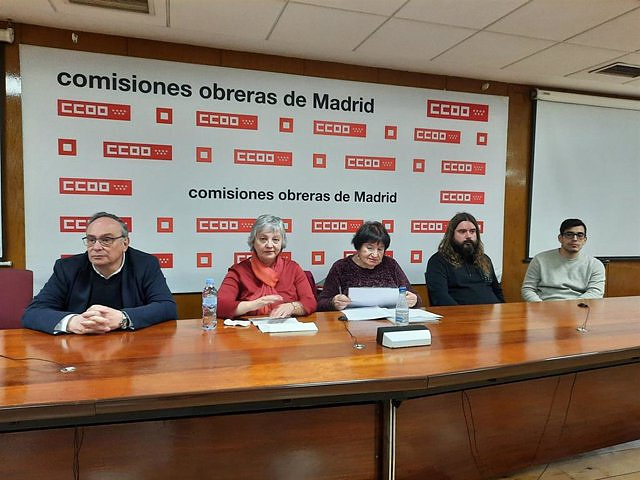One of the reprisals includes in his complaint the retired commissioner José Manuel Villarejo, whom he accuses of torturing him
MADRID, 21 Feb. (EUROPA PRESS) -
The State Coordinator of Support for the Argentine Complaint (CEAQUA) has reported on Tuesday the presentation of four new complaints against more than 30 agents of the State security forces and bodies for crimes ranging from crimes against humanity to murder and torture. of reprisals by the Franco dictatorship. One of the agents included in the complaints is the retired commissioner José Manuel Villarejo.
The four complaints are the one filed in the Ferrol courts by the brother of Moncho Reboiras, presumably murdered by the Police in 1975 with three shots in the back; the one presented in those of Valencia by the son of Vicent Almiñana, who would have been subjected to torture in 1972; the complaint filed by María Concepción Edo Gil who denounces torture in the Pamplona courts after her arrest in 1973 for distributing leaflets for a union; and the one presented in Madrid by Julio Pacheco Yepes, a member of the terrorist group FRAP who in 1975 denounces having been subjected to torture.
Jacinto Lara, from CEAQUA's legal team, explained at a press conference that these complaints are in addition to the one filed in Barcelona for the events at the Vía Laietana police station, and highlighted "the courage and bravery" of the people who have decided to take criminal proceedings "within a framework of impunity" since the Constitution was approved in 1978. He has lamented that in more than 40 years the State has refused to prosecute these crimes, and has pointed out that with the new law of democratic memory opens an opportunity for these crimes to be finally investigated.
In line, he recalled that, prior to these complaints, another 80 were filed that were inadmissible for processing by the Spanish courts, hiding behind the amnesty law. And he has commented that now is a good time to promote these criminal complaints given that there are opinions from international Human Rights organizations that censure impunity policies in this area and because in 2021 the dissenting votes of the Constitutional Court ruling in the Gerardo Iglesias case, where "the need for these complaints to be admitted for processing was put on the table."
He also recalled that in the "minimum" contents of that democratic memory law, the different parliamentary groups stated "that the framework of impunity was put to an end." "To see if it is fulfilled," she explained.
The Amnesty International spokesperson, Daniel Canales, has explained for his part that he hopes that these four complaints are an opportunity to give a response to those subjected to reprisals in accordance with international law, and different from the usual one that was based on the statute of limitations and the law. of amnesty.
"Amnesties are incompatible with studying acts of torture," he pointed out, adding that "this wall of decades must be torn down because pain is not healed with silence and oblivion but with justice."
The first of the cases presented this Tuesday was that of María Concepción Edo, who recalled that she suffered torture and humiliating treatment in June 1973 when she was only 19 years old. It all happened after a distribution of leaflets from a union, and she recalled that she herself threw a significant amount from the Telefónica building that people were picking up from the ground. "The street was ours", she has recalled her.
As he has recounted, when he returned home he found that there were people and suddenly he found himself rolling down the stairs. She was already at the police station, without being assisted by the doctors, they called her a "bitch, slut and whore", and they beat her between several policemen "from head to toe", mercilessly hitting her belly and abdomen.
He has pointed out that the experience left marked for life, with the displaced uterus, several misplaced vertebrae and chronic injuries with necropsy in one ankle. After a month in the hospital, they ended up diagnosing him with polyarthritis due to the blows, and she has also recalled the deplorable conditions of the different prisons he went through.
She has decided to present the complaint because she considers that it is necessary so that "the suffering of so many prisoners can come to light and be investigated", and she has called on the women and men who have suffered reprisals to join them. "I hope that mine is a small grain of sand so that those who tortured are judged," she has indicated. Her complaint includes the names of police officers José Blanco Martín and José Bernardo Barba Martín
The complaint filed by Julio Pacheco Yepes, presented in the Madrid courts, includes the torture suffered in the General Directorate of Security, in the Social Political Brigade, located in Puerta del Sol, in August 1975. He recalled that he was arrested in his apartment in Lavapiés when he was 19 years old, he was a member of the PCE and a member of the Antifascist and Patriotic Revolutionary Front (FRAP).
His arrest, he explained, was due to an attack that had occurred days before against a lieutenant. He was taken to police stations where he remained for seven days during which, he claims, he suffered torture during interrogation. "They wanted me to incriminate myself and say that I had been in command, they accused me of terrorism and then in November they transferred me to the Public Order Court," he said.
Now, after so many years, he has dared to sue the agents who allegedly tortured him because he considers that the moment is propitious. And among them he has cited the retired commissioner José Manuel Villarejo, who is being investigated by the National Court in the framework of the 'Tandem' case in more than thirty separate pieces. He adds to the complaint the names of José María González Reglero, Álvaro Valdemoro and José Luis Montero Muñoz.
In the case presented in the courts of Valencia, it is stated that Vicent Almiñana was arrested in June 1972 by civil guard agents together with nine other young people and they were accused of forming a group of the Marxist-Leninist Youth. According to the information provided by CEAQUA, the agents tried to incriminate them in demonstrations and Vincent was subjected to "ill-treatment, beatings, insults and threats.
After four months in jail and a one-year prison sentence, Vincent became claustrophobic. His son, Aùsias, sues the agents Martín Balaguer, Antonio Sánchez, Miguel Gil Martínez Forcano and Juan Cebrián Oroquieta.
In the case of Ferrol, the brother of Moncho Reboiras denounced crimes against humanity and murder in the events that occurred on August 12, 1975 as a result of a police operation. Reboiras was a leader of the Unión do Povo Galego (UPG) in the 0s, and because of the repression he lived in hiding.
That day in August, due to the police operation to search homes, and which mobilized 26 agents of the Ferrol Police General Corps, he decided to flee with other colleagues. He ran across the rooftops to distract the agents, but when he went down one of them onto the street they stopped him and intimidated him with shots into the air. Three of them hit him in the back and ended his life after bleeding to death in a doorway.
According to the note relating to the complaint, the agents decided to riddle that portal with bullets, fired grenades with tear gas and used battering rams to pretend that the murder had been the result of an armed confrontation.

 Exploring Cardano: Inner Workings and Advantages of this Cryptocurrency
Exploring Cardano: Inner Workings and Advantages of this Cryptocurrency Seville.- Economy.- Innova.- STSA inaugurates its new painting and sealing hangar in San Pablo, for 18 million
Seville.- Economy.- Innova.- STSA inaugurates its new painting and sealing hangar in San Pablo, for 18 million Innova.- More than 300 volunteers join the Andalucía Compromiso Digital network in one month to facilitate access to ICT
Innova.- More than 300 volunteers join the Andalucía Compromiso Digital network in one month to facilitate access to ICT Innova.-AMP.- Ayesa acquires 51% of Sadiel, which will create new technological engineering products and expand markets
Innova.-AMP.- Ayesa acquires 51% of Sadiel, which will create new technological engineering products and expand markets Unicaja lifts its first FIBA Champions League at the expense of Lenovo Tenerife
Unicaja lifts its first FIBA Champions League at the expense of Lenovo Tenerife Abascal (Vox) criticizes that Sánchez is "victimizing" himself and calls for elections after his possible resignation
Abascal (Vox) criticizes that Sánchez is "victimizing" himself and calls for elections after his possible resignation Carlos Alcaraz reaches the round of 16 in Madrid without breaking a sweat
Carlos Alcaraz reaches the round of 16 in Madrid without breaking a sweat Some 5,000 people demonstrate in front of Congress for democracy, hours before Sánchez's decision
Some 5,000 people demonstrate in front of Congress for democracy, hours before Sánchez's decision How Blockchain in being used to shape the future
How Blockchain in being used to shape the future Not just BTC and ETH: Here Are Some More Interesting Coins Worth Focusing on
Not just BTC and ETH: Here Are Some More Interesting Coins Worth Focusing on UPV students build a prototype of a wooden house to move to Equatorial Guinea
UPV students build a prototype of a wooden house to move to Equatorial Guinea The UA opens the call for the Impulso 2024 Awards for the best innovative business initiatives
The UA opens the call for the Impulso 2024 Awards for the best innovative business initiatives ALI, virtual assistant from Alicante, internationally recognized by the OECD
ALI, virtual assistant from Alicante, internationally recognized by the OECD Retrópolis brings the golden age of video games and computing to the UPV
Retrópolis brings the golden age of video games and computing to the UPV A million people demonstrate in France against Macron's pension reform
A million people demonstrate in France against Macron's pension reform Russia launches several missiles against "critical infrastructure" in the city of Zaporizhia
Russia launches several missiles against "critical infrastructure" in the city of Zaporizhia A "procession" remembers the dead of the Calabria shipwreck as bodies continue to wash up on the shore
A "procession" remembers the dead of the Calabria shipwreck as bodies continue to wash up on the shore Prison sentences handed down for three prominent Hong Kong pro-democracy activists
Prison sentences handed down for three prominent Hong Kong pro-democracy activists ETH continues to leave trading platforms, Ethereum balance on exchanges lowest in 3 years
ETH continues to leave trading platforms, Ethereum balance on exchanges lowest in 3 years Investors invest $450 million in Consensys, Ethereum incubator now valued at $7 billion
Investors invest $450 million in Consensys, Ethereum incubator now valued at $7 billion Alchemy Integrates Ethereum L2 Product Starknet to Enhance Web3 Scalability at a Price 100x Lower Than L1 Fees
Alchemy Integrates Ethereum L2 Product Starknet to Enhance Web3 Scalability at a Price 100x Lower Than L1 Fees Mining Report: Bitcoin's Electricity Consumption Declines by 25% in Q1 2022
Mining Report: Bitcoin's Electricity Consumption Declines by 25% in Q1 2022 Oil-to-Bitcoin Mining Firm Crusoe Energy Systems Raised $505 Million
Oil-to-Bitcoin Mining Firm Crusoe Energy Systems Raised $505 Million Microbt reveals the latest Bitcoin mining rigs -- Machines produce up to 126 TH/s with custom 5nm chip design
Microbt reveals the latest Bitcoin mining rigs -- Machines produce up to 126 TH/s with custom 5nm chip design Bitcoin's Mining Difficulty Hits a Lifetime High, With More Than 90% of BTC Supply Issued
Bitcoin's Mining Difficulty Hits a Lifetime High, With More Than 90% of BTC Supply Issued The Biggest Movers are Near, EOS, and RUNE during Friday's Selloff
The Biggest Movers are Near, EOS, and RUNE during Friday's Selloff Global Markets Spooked by a Hawkish Fed and Covid, Stocks and Crypto Gain After Musk Buys Twitter
Global Markets Spooked by a Hawkish Fed and Covid, Stocks and Crypto Gain After Musk Buys Twitter Bitso to offset carbon emissions from the Trading Platform's ERC20, ETH, and BTC Transactions
Bitso to offset carbon emissions from the Trading Platform's ERC20, ETH, and BTC Transactions Draftkings Announces 2022 College Hoops NFT Selection for March Madness
Draftkings Announces 2022 College Hoops NFT Selection for March Madness























